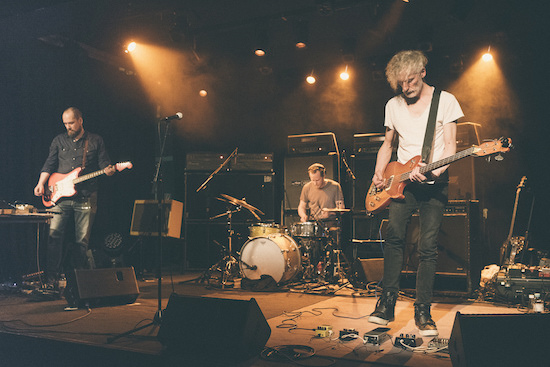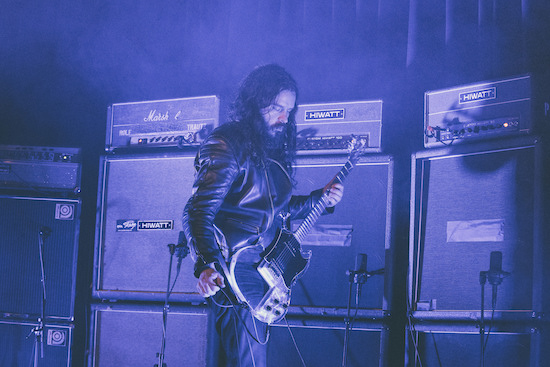Photographs by Clara Wildberger
For the first time in its 13 year history, Graz’s high achieving Elevate Festival has switched from being an autumnal late-October festival, into a first signs of Spring early-March affair. The switch has a lot of advantages – first of all, it’s not quite so drastically cold any more in Austria’s second city. Secondly, this section of the calendar is nowhere near as over encumbered with European festivals, and audiences aren’t so much fatigues as rearing to go after emerging from relative hibernation.
Going back to basics can be complicated
I arrive at the venue on the final night Elevate, and rather than the political discourse and strands of club and weird techno that made up the rest of the festival, Elevate has programmed in a trio of visceral, and somehow more traditional music performances for the evening. There’s not a laptop in sight. It really still says something wonderful about the state of music in 2017 when we can consider a free-jazz trio lead by Alex Zhang Hungtai (erstwhile known as Dirty Beaches), a set from Viennese avant-rock institution Radian, and a solo guitar ritual from Stephen O’Malley as arguably traditional in comparison to a no less exciting cavalcade of conceptual club music. On this cool Styrian evening Elevate’s also been dislocated from its standard home in the city’s cave venues within the Schloßberg (‘Castle-mountain’) at the centre of the city, taking place on a far more traditional stage.
As I enter the room a trio are all furiously drumming. It’s somewhere between the possessed drum skins of John Coltrane’s Olatunji Concert and the tribal multitracked drum kits of Boredoms. Portuguese drummer Gabriel Ferrandini (also drummer in RED Trio; ‘Portugal’s Necks’) is leading the charge from behind his kit, somehow rolling furiously over all his drums like a damn waterfall, issuing lightning speed fill after fill without breaking a sweat.
It soon becomes clear from my obtuse angle, that the seated guy in the centre is not only banging gongs and crashing cymbals, but also manning a hitherto quiet organ, suddenly emerging like jet plane from behind a cloud. It’s the second Portuguese musician of the three, long serving electro-acoustic artist David Maranha. Next up my eyes fall on the impeccably dressed and desperately handsome figure of Alex Zhang Hungtai, standing up from behind the drum he’s been berating for the last five minutes, holding his saxophone aloft and crooning into the microphone. He soon switches from natter to splatter and blasts sax squeals that slide into hushed horn laments, Ferrandini following suit from cymbal crashes into tom rolls and Maranha feeling his way down to the lower keys. While the other two are key members of Lisbon’s improvised music scene, the Taiwanese-born Canadian Hungtai sticks right out, his background in moody lo-fi songwriting and ambient pop contrasting every flicker of drum stick or sax key.
The agony and ecstasy of the improvisation Hungtai, Maranha, and Ferrandini make their way through ends up outshining their Cafe Oto session released last year as ncora. The focus on percussion and connection with brighter colouring actually strays beyond the free-jazz of the group’s original guiding light John Coltrane, and right into the psychedelic soul jazz of Pharoah Sanders. Best of all, Hungtai allows his alter egos to criss cross, and begins chanting and sing-speaking a la The Fall. It’s a desperately brilliant improvisation, and after a relatively subdued central section of longing chants and hanging tibetan cymbal notes, the trio spiral once more into furious drum rolls and blasts of organ and sax reaching a climax of fiery satori.

Sleight of hand never gets old
Somewhat-local heroes Radian (they hail from the Austrian capital some 200km north of Graz) contrast the explosive fire and primary colours of the previous trio with their own meticulous glitched brand of kraut and post-rock bathed. It’s tough to imagine quite how well the jagged rhythms and many strung together themes of Radian’s recent, most accessible to date, record On Dark Silent Off could be done live. In practice, the tightly woven trio hold it all together with meticulous sonic precision, almost miraculously.
Bassist John Norman and drummer Martin Brandlmayr go far beyond any normal rhythm section, adding dabs of colour and planned out imperfections to every string pluck or brushed drum skin. Tunes like the the title track from On Dark Silent Off play out practically like odd little game pieces, building up via a series of call and reply bass fumbles from Norman and pedal textures from guitarist Martin Siewert. Between the semi-industrial conversation between metal strings and Brandlmayr’s fuzzy snare brushing, the trio consistently hit those dizzying groovy peaks and throbbing heavy crescendos. It’s hypnotic, and above all it’s supremely satisfying.
This be the Ragmarockingest aeion
A third and final take on live music rounds off the evening, and anticipation creaks up a notch. A wall of Hiwatt amp stacks have been quietly crowding around the back of the stage since the night began, and we all know who they’re for (on a side note, sourcing several of these specific amps in Austria is no small feat). One of Sunn O)))’s core members, Stephen O’Malley, is in town to close out the musical programme at this year’s Elevate with a large and uncompromising dose of pure drone doom.
By now utterly distinct from the increasingly catholic timbres of both Sunn O))) and his collaborative projects KTL with Peter Rehberg and St. Francis Duo, O’Malley’s live solo show goes way back to the original bent of the Sunn O))) as heard on earliest recordings such as The Grimmrobe Demos. It comprises practically nothing beyond a leather jacketed Seattleite riffing as slow and hard as possible before a mighty wall of amps. The effect needless to say, is no less potent than it was two decades ago. After a few minutes strumming while feeling around the space, twiddling some amp knobs and tweaking some pedal settings, O’Malley stands stock still and slowly strums. Time seems to stop and our breath seems to slow in unison. All in attendance are tugged one by one into speechlessness – if nothing else it’s just impossible to chat over the din.
While Elevate has made its name with stellar programmes of discourse and discussion, of question-posing artists and genre-pushing performances, the chance to stop thinking and give over to the blissful nihilism of O’Malley’s black wall is welcome. It’s been a tough year.


